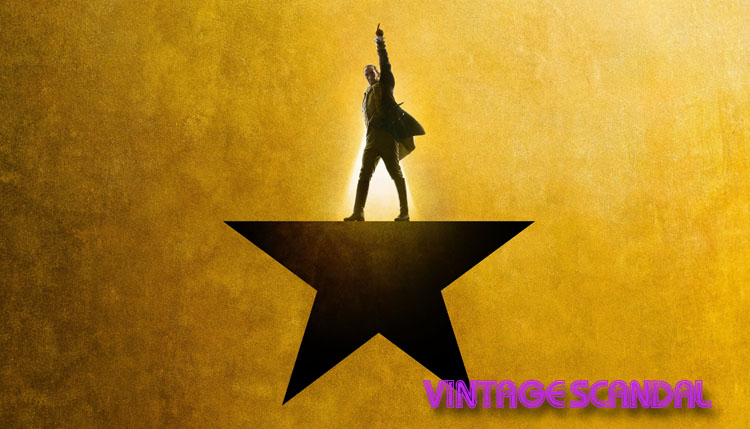
“Death doesn’t discriminate. Between the sinners and the saints. It takes and it takes and it takes. History obliterates. In every picture it paints. It paints me in all my mistakes. When Alexander aimed at the sky. He may have been the first one to die. But I’m the one who paid for it. I survived, but I paid for it. Now I’m the villain in your history.”
Hamilton, 2020 (Lin-Manuel Miranda) Walt Disney Studios
A little over 200 years from now, a lunatic alien/human hybrid will write the lyrics and compose the book for a sprawling, jaunty musical about the life of Donald Trump, from his early days as a real estate developer to his time as President of the United States of America. Each interlude will chronicle his marriages to Ivana (I-vana dis and I-vana dat!), Marla (and a Maximum Overdrive reference), and Melania (smiling politely). There will be songs with titles such as “Tweet-Storm,” “Orange Man Bad,” and “Yuge!” “Yuge!” will be an enormous centerpiece just before the first intermission, with Solid Gold dancers circling the 45th President, spinning mirror balls (look at them shine!), and showers of paper currency all over the stage.
The writer will try to present both sides — as an alien/human hybrid, it would have no choice but to be equanimous — and if Broadway can survive, Trump: The Musical will be a rip-roaring success in 2231. For now, we have Lin-Manuel Miranda’s Hamilton, a film document adapted from Miranda’s hit Broadway musical starring Daveed Diggs, Renée Elise Goldsberry, Jonathan Groff, Christopher Jackson, Phillipa Soo, and Miranda as the titular character.
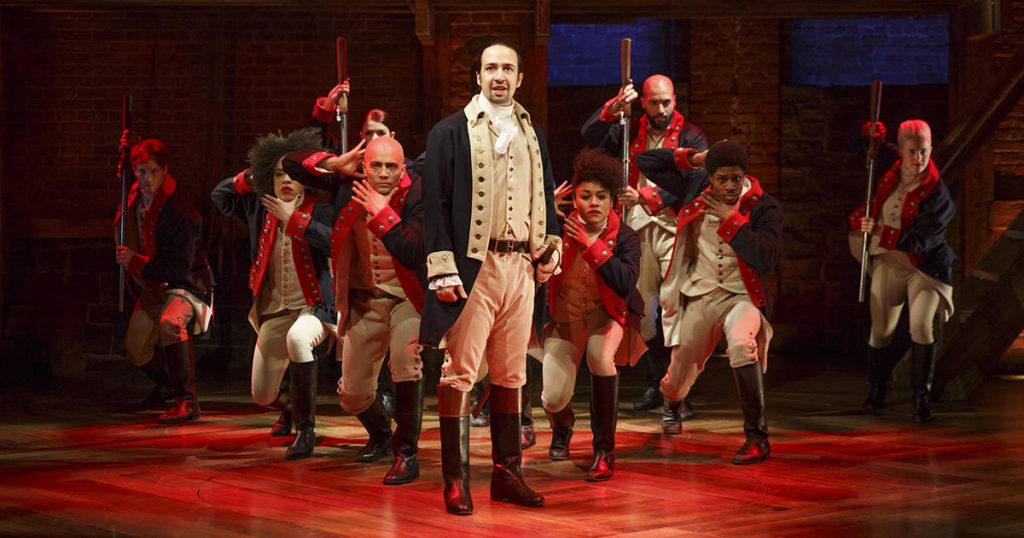
Based on the enormous biography by Ron Chernow (this book weighs a hundred pounds), I suspect Miranda chose Alexander Hamilton as the subject of his musical because, as a relative “footnote” in American history, Hamilton was known mainly for how he died rather than what he tried to accomplish. In fact, if you’re looking for a history lesson in Hamilton, you will be sorely disappointed. Hamilton is a musical about love and lust, and meetings, lots of meetings between soldiers and politicians. It reminded me of how we were all eagerly awaiting The Phantom Menace, and then we saw that the first half of the movie was made up of trade disputes and negotiations. What the …?
Where Miranda succeeds is in attempting to make sense of these men (and women) in the context of modernity through the use of contemporary music and a mixture of authentic and anachronistic dialogue. Where Miranda fails is in the “bottom-heavy” story. There were more than a few times when I looked at my watch and wondered when we were going to get the point of this epic. I don’t even know that there is a point, other than that Alexander Hamilton was not a terribly bright person as well as extremely naïve.
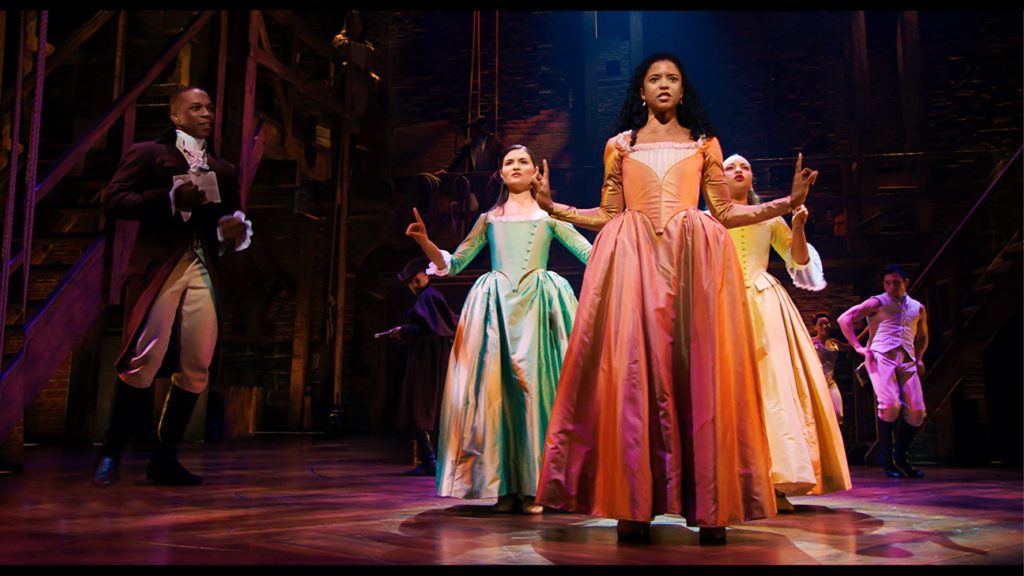
In spite of (or because of) Hamilton’s innocuous place in American history, it occurs to me that, with the right conglomeration of talent in the creative community, a musical can be made about anyone. If you can establish relationships and marriages, you can write songs about conflict and love. It doesn’t matter whose story you’re telling, you can make anything interesting. There’s an incredible musical about mulching and fertilizer out there just waiting to be told!
For the purposes of Hamilton, orphaned Alexander Hamilton arrives in New York as a teenager, becomes aide-de-camp to General George Washington, marries Eliza Schuyler (Soo), serves in the Revolutionary War, is involved in a sex scandal and blackmailed, admits to his infidelity (thus assuring he’ll never be President, it was a different time), and dies in a duel with verbal sparring partner, Aaron Burr, shortly after his own son, Philip, also dies in a duel. It’s kind of a downer ending for such an upbeat musical, but we knew it was going to happen. Like Titanic, we know the boat has to sink. Nobody’s rewriting history here.
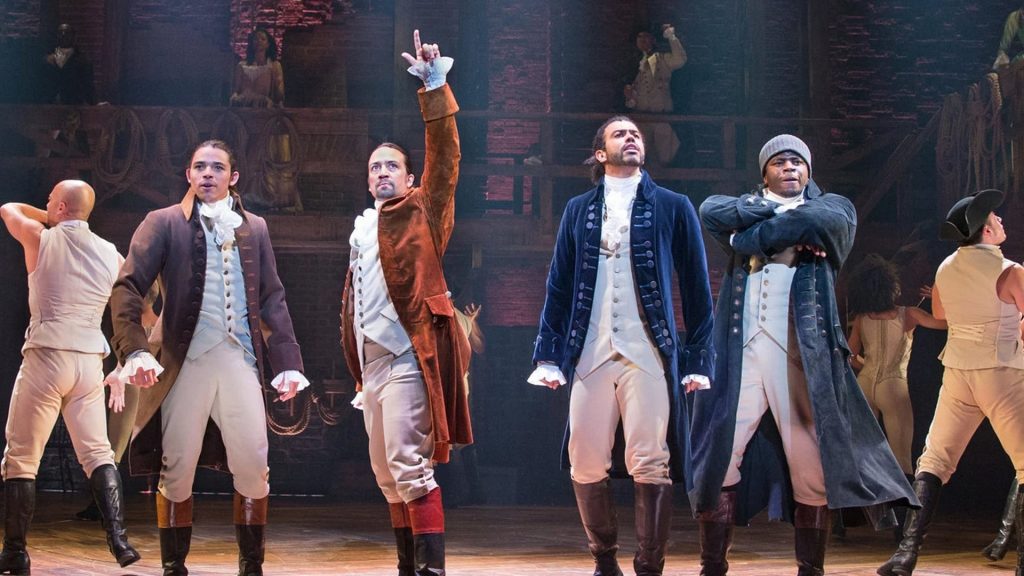
Miranda’s analysis of Hamilton assumes his advocacy of “moderation.” That of the conflicting conveyance of law in the various branches of government (in a somewhat noble effort to squash tyranny), while side-lining Hamilton’s belief in over-reaching Federal powers. In his Federalist papers, he pushed for policies that would, today, be referred to as totalitarian (but in a “benevolent” fashion). He does debate the idea of “State’s rights,” losing the plot of why the Colonies fought for independence in the first place.
One of the more engaging aspects of Hamilton is the off-center King George (Groff) watching in disbelief as his fragile fiefdom is dismantled. He cannot comprehend how power can change hands simply by a process of election. Like so many who watch our electoral processes from the outside looking in, he just doesn’t get it. Thankfully, Miranda doesn’t go too far into the weeds, instead entertaining us with energetic performances from the principal cast (particularly Diggs, Soo, Groff, and Goldsberry) and ensemble. Hamilton is more invested in the tragedy than the motivation. Instead of a man consumed in terrible events, Hamilton is a man who creates his misery. He is the useful idiot.
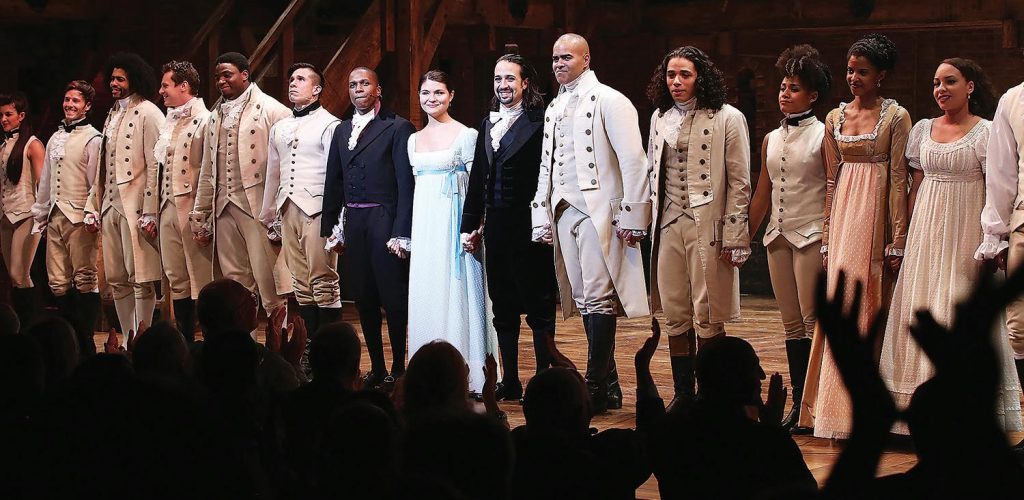
When he advises his son, Philip, to aim his pistol in the air during the duel with lawyer George Eacker (after Eacker had slandered his father), he does so in an effort to retain his honor by participating in the duel, but not be branded a murderer. Philip follows his father’s advice, and it doesn’t go well. According to Hamilton, he tries to take his own advice in the duel with Burr (Leslie Odom Jr.), with the same result. Burr, for his part in Hamilton, functions as a Greek Chorus (much like Ben Vereen in Pippin) commenting on, and then actively participating in, the story. Pippin was very much at the forefront of my mind while watching Hamilton with a couple of references to Chess for good measure. Hamilton is a product of our times.
If I have a criticism, it’s that the movie-stage musical is way too long considering the subject matter. This is a video document of a Broadway stage musical. There is only one set. There are some decent lighting effects and excellent sound design as well as an impressive interpretation of a symbolic hurricane (a visual metaphor for the torrent of Hamilton’s passion), but it isn’t enough to carry a bloated two hours and forty minutes on the television screen. I couldn’t imagine having to do this every day for five years and hundreds of performances, but that’s the magic of Broadway!
Welcome to VINTAGE SCANDAL! Every so often, I’ll be covering a film or other entertainment product about a real-life controversy.
For more discussion of Hamilton, check out our New Stuff podcast (with special guest Bronwyn Knox)!



